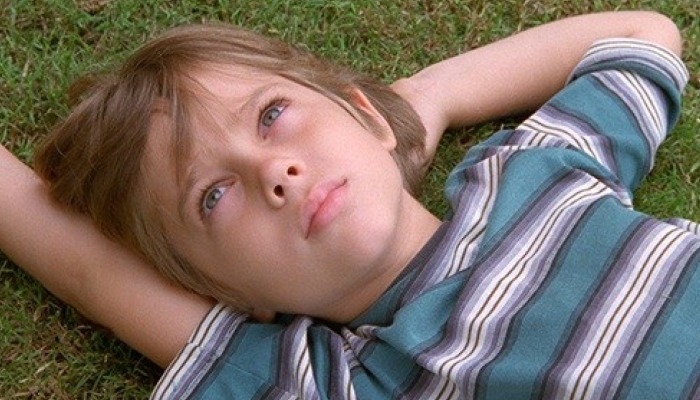 (5 / 5)
(5 / 5)
You hear a lot of talk about ambition in film: ambitious scale, ambitious complexity, ambitious effects.
It’s rare though that a story is ambitious simply in its conception, in its commitment to telling a story. Richard Linklater’s Boyhood is such a film, a film that could be said to define his whole body of work.
The best of his canon, specifically the Before trilogy, has always embraced a sense of complete naturalism. Julie Delpy and Ethan Hawke’s idealised but flawed relationship, maturing over the course of three films and eighteen years, are arguably the truest, most romantic films ever made. The passage of time – slow, hard-won maturation – has always been important to Linklater as both writer and director, never more so than in Boyhood.
We watch as, over the course of twelve years, a young Texan boy, Mason Jr. (Ellar Coltrane), grows to young manhood before our eyes. Given Linklater himself is a Texas native, it may be tempting to view the story as autobiographical, but it nevertheless feels universal. From early squabbles with his self-possessed older sister, Samantha (Lorelei Linklater) to his blossoming late teens, we are witness to Mason’s growing up; Coltrane’s too. The whole thing feels perfectly organic, as though we’re simply watching events play out.
Ethan Hawke and Patricia Arquette – remember her? – are perfectly cast as the loving but absent, wisdom-dispensing dad, unprepared for the everyday rigours of parenthood, and the single mum, struggling through a succession of difficult relationships, and. Linklater’s camera is loose but focused, never too static or too wandering, returning time and time again to these same familiar but evolving characters. Haircuts, make-out sessions, first days at school, joys and heartbreaks both great and small, no other film has ever captured quite what it means to grow up.
Boyhood is a long film – twelve years over the course of nearly three hours – but it earns it length for its ebbs and lulls feel too like part of life. There’s no real in-built conclusion, but the film is, by its very premise, open-ended; you can slip away for whole minutes only to find yourself drawn back in by a moment that holds particular resonance for you. Conversational, sometimes even mundane, Linklater displays spellbinding confidence here: never before has a film so captured the magnificence of that long littleness of life.
This is the type of cinema that changes people; it defies attempt to express its totality. With its time capsule run-through of early 21st Century history and culture – Harry Potter, the Iraq War, Obama’s election – Boyhood feels like a product of our time, but one that seems likely to endure. Compelling story and infinitely watchable lead, Boyhood is the risk that paid off; so much that could have gone wrong and yet we’ve ended up with… this.
Boyhood, simply put, gets it: get what it means to be a kid, to grow up, to grow old, to live each day and watch them slowly build to something, for better or worse, you could never have seen coming. The only way to understand quite what that means is to see it for yourself. Do so, I urge you.
